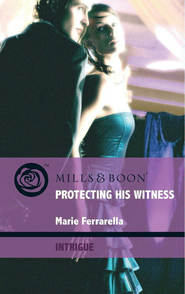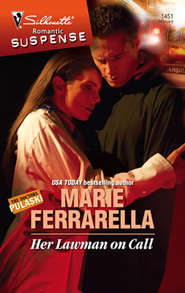По всем вопросам обращайтесь на: info@litportal.ru
(©) 2003-2024.
✖
Coming Home For Christmas
Автор
Год написания книги
2019
Настройки чтения
Размер шрифта
Высота строк
Поля
“Nothing,” Abe repeated, then went on to explain. “Your mother wrote out a check once she’d decided what she wanted. Always knew her own mind, that lady,” Abe commented with just a hint of an appreciative laugh. “She prepaid her funeral expenses. She just wanted you to fill in the paperwork.”
He should have known. She’d become almost flighty in that year after Amy’s death, but at bottom, she was an exceedingly proud, responsible person who always insisted on paying her own way. He supposed funeral expenses were no different for her. Making him fill out the paperwork was just her way of reminding him that she was still in charge, even though she was no longer around.
Closing the checkbook again, he slipped it into his jacket’s inside breast pocket. “So I guess if there’s nothing further you require from me, I can be on my way.”
Abe’s finely curved eyebrows drew together as his brow furrowed. He gazed at Keith as if he couldn’t comprehend what had just been said.
“Don’t you want to view the body?” he asked, seemingly convinced that Keith hadn’t really meant he wanted to leave without seeing his mother. “Our in-house cosmetic artist did an excellent job,” he added quickly. “In case you think seeing her this way might be too difficult for you, I assure you that your mother just looks like she’s sleeping.” The lanky funeral director was already on his feet, ready to lead the way into Dorothy O’Connell’s viewing room. “Come, I’ll take you to the room myself. You’ll be the first one to see her—other than my staff, of course.”
Keith wanted to tell the man there was no need to bring him to his mother’s viewing room. He wanted simply to beg off and leave. After all, he hadn’t spent any time with his mother in the last ten years of her life. Why would he want to spend any time with her now that she was dead?
But he had a very strong feeling that if he left, the funeral director would only keep after him until the man got him to change his mind—or lose his temper. He might as well spare himself the aggravation. And this way, after he got this viewing over with, he’d be done with it once and for all.
So, against his better judgment, Keith allowed himself to be led into the viewing room.
He was prepared to mumble a few token words of grief for Abe Morrison’s benefit and then leave the funeral home and this part of his past once and for all.
What Keith wasn’t prepared for was that the funeral director would leave him alone in the viewing room.
And he definitely wasn’t prepared for the impact that being alone with his mother’s body would have on him. Logically, he knew it wasn’t her. It was just the empty shell of what had once been his mother.
And yet...
She still seemed to be right there, a part of everything. A part of him.
Keith felt as if someone had stolen the breath out of his lungs, then sat on his chest, daring him to suck air back in.
He couldn’t.
For just a second, before he regained control over himself, Keith thought he was going to black out.
“Guess you got in the last word, after all, didn’t you?” he asked his mother, the question barely above a whisper.
Keith felt tears gathering in the corners of his eyes, and he damned himself for it and her for making him have to go through this.
“This doesn’t change anything, you know,” he told her gruffly. “This death thing isn’t going to soften me and make me decide you were right and I was wrong. I wasn’t wrong. You were. Wrong to act like life was one great big party, wrong to act like you were a teenager, living life to the fullest—and more.
“I know what you were trying to do,” he told the still form lying in the blue silk–lined casket. “You were trying to live Amy’s life for her after she couldn’t live it herself. But you couldn’t do that,” he pointed out, the very words he uttered scraping against the inside of his throat. “Nobody gets to live someone else’s life. Everybody’s got one chance to live, and if that’s taken away, well, then it’s gone.”
He leaned over the casket just a tad, bringing his face in closer to hers. Damn it, the funeral director was right. She did look as if she were sleeping.
He felt as if Death—and his mother—were rubbing his nose in the fact that she was gone.
“There are no do-overs, even if you thought there should be. You don’t get to decide things like that,” he informed her. And then his voice grew louder as his anger came to the fore. “Don’t you think it tore me apart, seeing you do that? Acting like Amy when Amy wasn’t there anymore? You were her mother—my mother. You were supposed to act like one, not like some teenage girl with a mission.
“And where did all that get you in the end?” he demanded heatedly. “Nowhere, dead on a slab, that’s where it got you.” Because now that he thought about it, his mother’s erratic, age-denying lifestyle must have contributed to her demise. “Now your life’s gone, too, just like Amy’s.”
The disgust abated from his voice, and it softened again just a hint. “Maybe you could have lived longer if you hadn’t lived so crazy. I don’t know, and it’s too late to find out.” He turned to leave, then stopped, another wave of recrimination hovering on his lips. “But you shouldn’t have done it. You shouldn’t have,” he repeated, stopping short of raising his voice to the level of shouting.
He didn’t want to attract anyone to the room. Having a meltdown here in the middle of the funeral home was bad enough without it being witnessed by a bunch of strangers.
Still, Keith stood there in the room for a few more moments, doing his best to pull himself together. Searching for a way to reconcile the fact that he was never going to see his mother’s face again. This was to be the last time he’d see her, and he told himself that he shouldn’t care.
But he did.
Calling himself a fool, Keith squared his shoulders and turned to walk out of the small viewing room. He didn’t have time for this, didn’t have time to let something as useless as grief eat away at him. He had loose ends to tie up and a busy life to get back to. He wouldn’t stand around and mope over a woman who had had no regard for him whatsoever, who had shut him out when he’d tried to reach her and make her accept reality.
This, he thought, taking one last look at Dorothy O’Connell, was the final reality.
Turning, he took a long stride out of the room—and walked straight into the young woman he couldn’t quite place, who was standing just outside the room.
And who was apparently, if the expression on her face and the tears glistening in her eyes were any indication, listening to every word he’d just said to his late mother.
Chapter Four (#ulink_e8f9e226-4f8c-5398-964e-4685af519918)
It was a toss up whether he was more surprised or angry to find her there.
“Please tell me you’ve found a buyer for all those things in the house. Either that, or you suddenly need a funeral home, because otherwise, you have absolutely no reason to be here right now, hovering outside my mother’s viewing room,” he informed her.
He wasn’t all that sure he could tolerate the truth, but he wasn’t about to put up with any kind of lie.
“You’re my reason,” she told him, her voice as quiet as his was sharp.
Stalker.
The word flashed through his head in big, bold letters. Was that what he’d done, hired a stalker? The possibility made him angrier.
The scowl on his face was meant to be intimidating. “You’re going to have to explain that. Carefully,” he warned.
His eyes held her prisoner, as if to say that he could see right through her and would immediately know if she was lying to him.
Because he seemed so angry, Kenzie deliberately curbed her habit of speaking quickly. Instead, she enunciated every word that she uttered so he could absorb it.
“You were coming here alone, and this isn’t the sort of thing a person should have to face alone,” she told Keith with feeling. “I thought you might need a friend, so I came.”
Keith stared at her. “You’re not my friend. We have a working relationship,” he reminded her tersely, then added, “I don’t make friends that easily.”
That she could readily believe, despite how popular he’d once been. Still, even though he had apparently changed, that didn’t alter the way she felt about what he was going through or what had initially compelled her to come to the funeral home, looking for him.
Given what she’d heard him say when he thought no one was listening, she knew better than most what he was going through.
Kenzie approached the subject slowly. “I had an argument with my father.”
Keith’s scowl deepened. “I’m not your priest, either, which means I don’t do confessions.” And then his curiosity about what she was thinking got the better of him. “What does your argument with your father have to do with me?” he demanded.
Kenzie pretended that he hadn’t asked any impatient questions. Instead, she went on as if the man she addressed was quietly waiting to be enlightened.
“My father definitely had opinions about my lifestyle, my choice of friends. You know, all the usual reasons fathers and daughters butt heads. I put up with it for a while, then decided that if that was how he felt, it was his loss, not mine, and I stopped talking to him. I refused to return his calls and, to make a long story short—”











